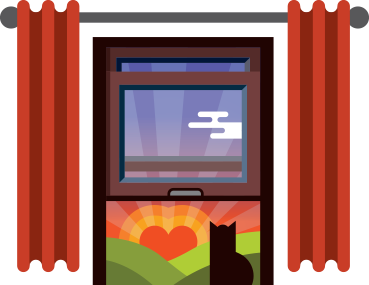Our Program
The Fellowship Home provides 6--18 months structured transitional living for recovering addicts and alcoholics while they remain abstinent and practice principles found in the 12-Step programs. We practice a straightforward, no-nonsense approach--believing that is crucial for the individual put to put as much or more effort into recovery as we do.

Community Service
Our purpose is to help residents develop and maintain a new lifestyle for themselves, but we believe the most effective and comprehensive therapy is found in the act of helping other people, as soon as possible. New residents are given a few days to become familiar with the schedule and customs of the SWV Fellowship Home; however, once residents get settled in, they are asked to participate in community service. Currently our residents help at the local soup kitchen and community clothing and food pantry, as well as assisting several of our local churches. Our residents also take 4-hour shifts on the local AA Hotline, helping people find local meetings and other resources.
12-Step Facilitation
The SWV Fellowship Home program has been based around 12-Step principles since we opened our doors in 1967. Our 12-step facilitation involves on-site 12-step meetings and classes—both Alcoholics Anonymous and Narcotics Anonymous—as well as transportation to outside AA and NA meetings. We also help residents get involved in a 12-step program by offering guidance in the basics of recovery and 12-step meeting etiquette, encourage residents to get an AA or NA sponsor and homegroup, and participate in service work for their homegroup. And finally, understanding and working the twelve steps is emphasized to residents at all phases of their stay here.
Classes & Education
Addiction can rob individuals of the ability and opportunity to learn basic skills necessary to live independent, productive lives. Our classes provide residents with new skills and help them learn new ways of thinking and acting, and help them discover new talents and abilities within themselves. In addition to our 12-Step literature classes, some of the educational components offered at the SWV Fellowship Home are:
• Relapse Prevention & Anger Management
• Hygiene & Self Care
• Nutrition, Exercise & Physical Wellness
• Decision Making & Refusal Skills
• Values, Responsibilities, & Attaining Goals
• Distress Tolerance & Emotion Regulation Skills
• Stress Reduction, & Building Resilience
• Interpersonal Skills & Parenting
• Spirituality, Meditation, & Mindfulness
• Sexual Health & Healthy Relationship Skills
• Vocational & Educational Goals & Job Readiness
• Money Management & Securing Housing
Click the "Get Description" button below to view a complete breakdown of the classes offered by Southern West Virginia Fellowship Home...
Get DescriptionsIndividual Case Managment
To ensure that our residents are living up to their potential, each resident is assigned a case manager and recovery coach within 48 hours of moving into our house. Our individualized case management program is staffed by former residents with both recovery coach training and experience in 12-step recovery. Our case managers assist residents in navigating the realities of a new life in recovery by providing guidance in 12-step principles and offering feedback about their progress via weekly progress sheets. They also assist residents with classwork and provide referrals for resources concerning any medical, mental health, educational, and vocational issues they may have. Each resident spends at least two hours with his case manager every week.
Recovery Coach Program
In addition to having a case manager, each resident will be assigned a recovery coach. Our recovery coach program is staffed with CCAR-trained recovery coaches who promote recovery by helping remove barriers and obstacles to recovery, link the recovering person to the recovery community, and serve as a personal guide and mentor in the management of personal and family recovery. Each resident and their assigned recovery coach are provided with a Recovery Wellness Plan, which focuses on seven areas of recovery—connection to the recovery community, physical, emotional, and spiritual health, living accommodations, job/education, and daily living management. Residents meet with recovery coaches at least twice a month, but can meet with them more often if necessary.
5 Phases of the Program
Program days are determined by having a certain number of classes, community service hours, and 12-step meetings completed, in addition to physical days. The following details the minimum requirements for each major period of residency.
Phase 1 (30 Days Minimum)
SERVICE & MEETINGS REQUIRED
• 45 - Hours Community Service
• 68 - AA/NA Meetings
CLASSES REQUIRED
• 3 Relapse Prevention
• 4 Living Skills
• 4 Anger Management
Phase 2 (60 Days Minimum)
SERVICE & MEETINGS REQUIRED
• 100 - Hours Community Service
• 116 - AA/NA Meetings
CLASSES REQUIRED
• 7 Relapse Prevention
• 8 Living Skills
• 8 Anger Management
Phase 3 (90 Days Minimum)
SERVICE & MEETINGS REQUIRED
• 145 - Hours Community Service
• 164 - AA/NA Meetings
CLASSES REQUIRED
• Completed Relapse Prevention
• Completed Living Skills
• Completed Anger Management
• 1 Sexual Health
Phase 4 (180 Days Minimum)
SERVICE & MEETINGS REQUIRED
• 260 - Hours Community Service
• 260 - AA/NA Meetings
CLASSES REQUIRED
• Completed Sexual Health
• Completed Parenting
• Completed Dialectical
• Completed Job Readiness
• Completed Housing
• 4 Living in Balance
Phase 5 (365 Days Minimum)
SERVICE & MEETINGS REQUIRED
• 442 - Hours Community Service
• 442 - AA/NA Meetings
CLASSES REQUIRED
• 12 Living in Balance
